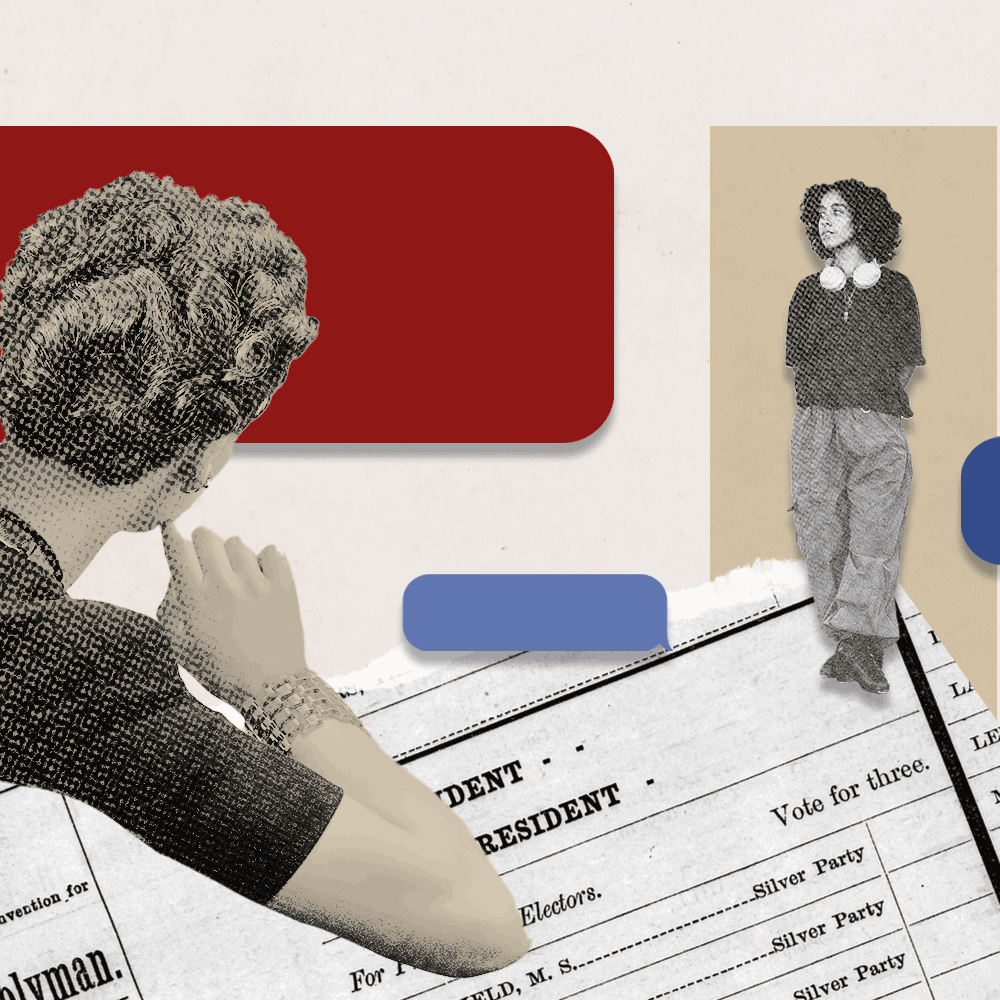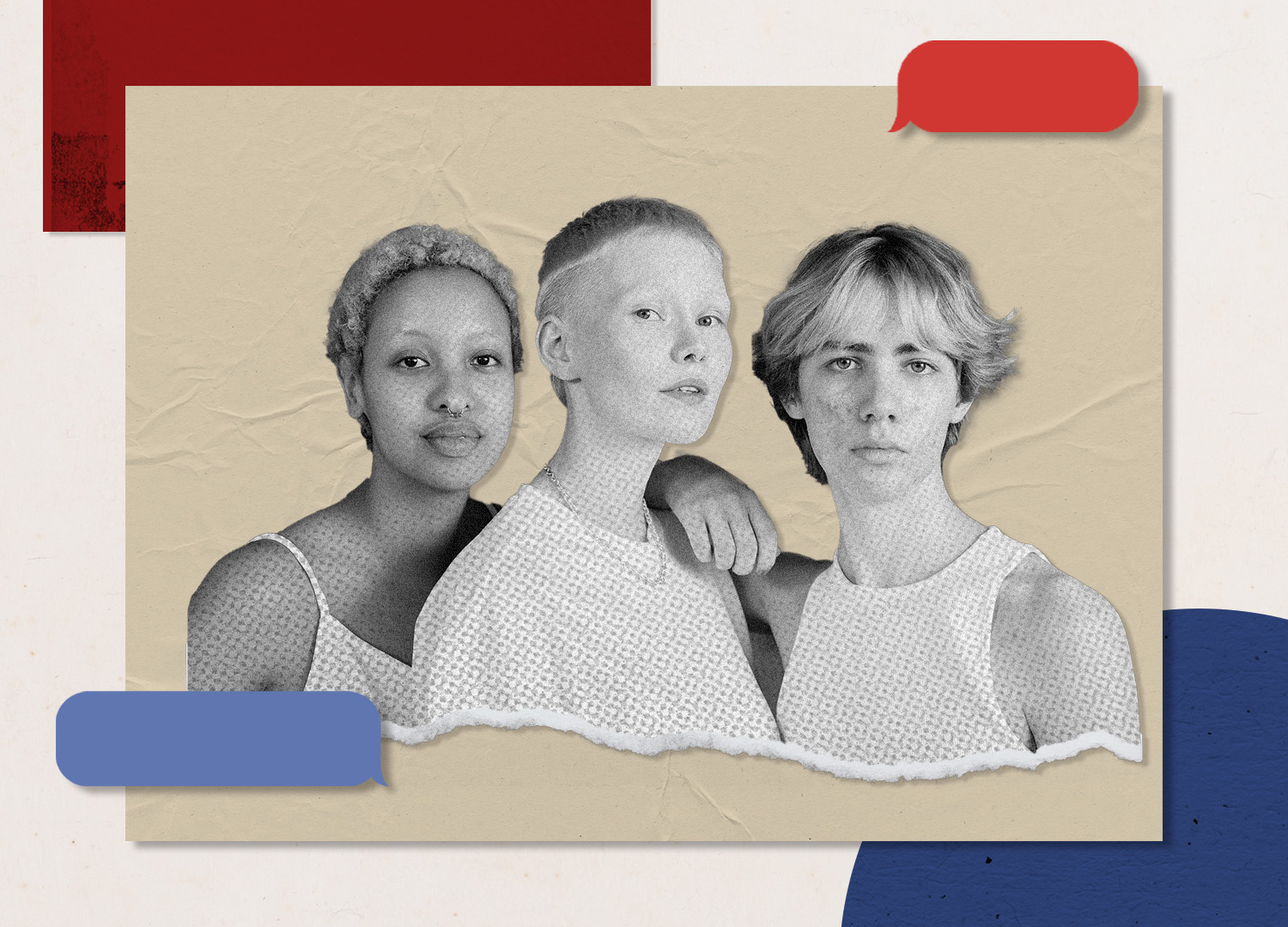
Forty one million members of Gen Z will be eligible to vote in November—that’s nearly 17 percent of the electorate, which means their vote matters. And eight million of those Zoomers could be voting for the first time.
Though youth voter turnout is traditionally weaker than other voting blocs, members of Gen Z voted at a higher rate in 2022 than millennials and Gen X-ers did at their age. “This is a very politicized and engaged generation,” says Cristina Tzintzún Ramirez, president of NextGen America, the country’s largest youth voter organization. They are a generation that has dealt with the ramifications of climate change, prolific gun violence, a global pandemic, multiple international wars, and fluctuating economies. They care about the world around them—but they still may need some encouragement to go out and vote.
“We’ve been raised in an environment that makes it really hard to have faith in government and elections, which makes voting challenging,” says Sonja Aibel, 17, a college freshman from Brooklyn, NY and Youth Civic Engagement Lead for YVote, which offers civic programming for teens.
Empowering people is not telling them why you think they should care. It's about empowering them so that they have the tools to act on what they care about.
That’s why, as election season kicks into high gear, it’s important to encourage the Zoomers in your life to head to their polling place on November 5. Even small conversations can have a big impact: A 2023 study showed that parents can transmit political apathy to their children, and that not talking to your children about politics may contribute to low youth voter turnout. In a Marie Claire survey of women, conducted in partnership with the University of Massachusetts Lowell’s Center for Public Opinion this year, young people between the ages of 18 and 29 responded that 52 percent of the time they almost always or often vote for the same political candidate as their mother.
Of course, having those discussions may not be easy: Engaging in conversations about politics takes empathy, understanding, and a reminder to check your ego (and views) at the door. Ramirez’s advice: “Listen, connect to their power, to their pain, and make sure you don't talk down to them, which a lot of older people unintentionally do.” Ahead, Ramirez and Gen Z-ers explain how to talk about politics with the young people in your life.
I never talked about politics with my parents. Should I even bring it up with my kids?
Older generations may be inclined to leave politics out of dinner table conversation for fear of being rude or divisive, but regularly having low-stakes conversations about everyday news can help make it easier to talk about the national election.
“Sit down and chat about how there's some rally that we just saw today and how interesting it was to see Kamala Harris or Donald Trump talk about this or that,” says Nivriti Deshpande, 17, a high school senior from Bentonville, Arkansas, who is a member of Senator John Boozeman’s (R-AR) Congressional Youth Cabinet and the chief financial officer of LOUDWomen, a nonprofit organization dedicated to empowering and educating young women and rural students. Even though she doesn’t always agree with her parents’ perspectives on politics, Deshpande says discussing daily news, differing viewpoints, and policies routinely can empower teens to want to use their voices beyond their home—at the polls or otherwise.
How do I have conversations with a generation whose views differ from mine?
“The parent’s role is not to sway their kid,” Aibel says. Instead, “hold up a mirror to their own power to make change on the things they care about,” Ramirez says. Ask the Zoomer in your life what issues are most pressing to them. “Really listen to what's important to them,” Ramirez continues. “Empowering people is not telling them why you think they should care. It's about empowering them so that they have the tools to act on what they care about.”

How can I get them excited about voting?
“I really wish my parents had conversations with me about the power of my vote instead of having to learn it on my own,” Deshpande says. Having those conversations can be as simple as connecting the issues that matter to them to the potential results of this election, Aibel notes. For example, explain that by voting, they could impact who gets to appoint Supreme Court Justices and how the Court’s votes have impacted rulings in the past (like the Dobbs decision, which overturned Roe v. Wade).
Identify specific people in your lives who have been impacted by these rulings. “Communicate the stories and the people that are on the line rather than politics and laws,” says Christine Li, 17, a high school senior from Brooklyn, New York, who is a student leader at YVote. Personalizing the policies and the outcomes of recent elections makes it easier for people to see how voting can impact someone’s daily life.
If there’s a local issue a young person you know cares about (like universal free breakfast and lunch at their school), encourage them to learn about how local candidates think about those issues and how they would change local policy if they were elected. For example, “in New York City, people care about trash pickup and bike lanes. Things like that are often much less polarizing [than national political issues],” Aibel says.
What can I do to make sure they actually vote?
“Modeling election day etiquette is so impactful,” Li says. This is especially true for folks who are voting for the first time. Many newbies are casting ballots in college or in new cities where they may not know how to register or find their polling place. “It's not just like, ‘Oh, I'm going to head to the polls now,’” Aibel says. “It's like, ‘I'm going to figure out how to get an absentee ballot to my dorm or figure out the registration deadline in the new state I live in.’ It's a huge logistical challenge.” Offer to help your Zoomer figure out the details and walk them through your own voting plan, including the where, when, and with whom. Set Google Cal reminders for both of you, so you can keep each other accountable and remember deadlines together.
Listen, connect to their power, to their pain, and make sure you don't talk down to them, which a lot of older people unintentionally do.
How do I get them off social media and onto other news sources?
“There's a lot of condescension from older generations about Gen Z's use of social media to obtain information about politics,” Aibel says. “I find that really upsetting because whether or not older people like it, it is a huge source of information for me and my peers.” Try to understand how the young people in your life uses social media to engage with the news. Ask them to show you who they follow for political info and how they know what’s real and what’s fake. Come at the discussion from a place of wanting to learn, not wanting to convince them that they’re doing it wrong. And if you feel that they need a little help identifying misinformation, fact-check and research sources together.
What if they think I’m an old dork who they can’t relate to?
Suggest that they discuss their voting plans with their friends since they might feel like they’re able to be more honest, open, and engaged when they don’t have to deal with an adult trying to be all “how do you do, fellow kids” with them (even if you don’t mean to be). “When it's possible for students to give resources to each other, that's even better than adults having these conversations with kids,” Aibel says. “Everything is better when it's peer to peer.”








